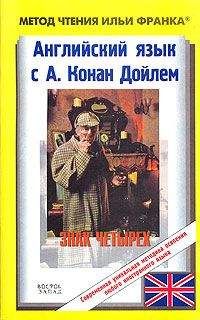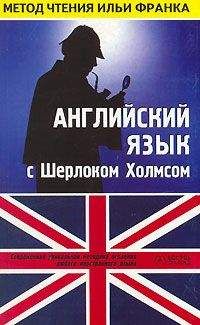"We searched the garden that night (мы обыскали сад той ночью), but found no sign of the intruder (но не нашли ни следа непрошенного гостя; to find — находить; intruder — навязчивый, назойливый человек; незваный гость), save that just under the window a single footmark was visible in the flower-bed (если не считать единственного отпечатка ноги в цветочной грядке как раз под окном; visible — видимый). But for that one trace, we might have thought that our imaginations had conjured up that wild, fierce face (если бы не один этот след, мы могли бы подумать, что это дикое, свирепое лицо — плод нашего воображения: «наше воображение вызвало это дикое, свирепое лицо»; to conjure up — вызывать в воображении; to conjure — заклинать, вызывать духов). We soon, however, had another and a more striking proof (вскоре, однако, мы получили другое и более яркое доказательство; striking — поразительный, изумительный) that there were secret agencies at work all round us (того, что вокруг нас плели свои сети какие-то тайные силы; agency — агентство; сила, фактор; be at work — действовать). The window of my father's room was found open in the morning (окно комнаты моего отца утром обнаружили отворенным), his cupboards and boxes had been rifled (шкафы и ящики были перерыты; to rifle — обыскивать с целью грабежа), and upon his chest was fixed a torn piece of paper (а к его сундуку пришпилен оборванный клочок бумаги; to tear — рвать), with the words 'The sign of the four' scrawled across it (с накарябанными на нем словами «Знак четырех»). What the phrase meant (что значила эта фраза), or who our secret visitor may have been, we never knew (или кто был наш тайный посетитель, мы никогда не узнали). As far as we can judge, none of my father's property had been actually stolen (насколько мы можем судить, ничего из собственности отца на самом деле не было украдено; to steal — воровать; actually — фактически, на самом деле, в действительности), though everything had been turned out (хотя все было перевернуто; to turn out —выворачивать). My brother and I naturally associated this peculiar incident with the fear which haunted my father during his life (естественно, мой брат и я связали этот своеобразный инцидент со страхом, который преследовал отца всю жизнь; to haunt — часто заезжать, навещать; /о привидении/ жить, обитать; являться; мучить; не давать покоя); but it is still a complete mystery to us (для нас это по-прежнему полная загадка)."
search [sǝ:ʧ], conjure [ˈkʌnʤǝ], fierce [fɪǝs], agency [ˈeɪʤ(ǝ)nsɪ], cupboard [ˈkʌbǝd], rifle [raɪfl]
"We searched the garden that night, but found no sign of the intruder, save that just under the window a single footmark was visible in the flower-bed. But for that one trace, we might have thought that our imaginations had conjured up that wild, fierce face. We soon, however, had another and a more striking proof that there were secret agencies at work all round us. The window of my father's room was found open in the morning, his cupboards and boxes had been rifled, and upon his chest was fixed a torn piece of paper, with the words 'The sign of the four' scrawled across it. What the phrase meant, or who our secret visitor may have been, we never knew. As far as we can judge, none of my father's property had been actually stolen, though everything had been turned out. My brother and I naturally associated this peculiar incident with the fear which haunted my father during his life; but it is still a complete mystery to us."
The little man stopped to relight his hookah (человечек замолчал: «остановился», чтобы раскурить потухший кальян: «зажечь заново кальян») and puffed thoughtfully for a few moments (и несколько мгновений задумчиво пускал дым). We had all sat absorbed, listening to his extraordinary narrative (слушая его удивительнейшее повествование, мы все сидели, затаив дыхание; to sit — сидеть; absorbed — абсорбированный; поглощенный; narrative — рассказ). At the short account of her father's death Miss Morstan had turned deadly white (во время короткого рассказа о смерти ее отца мисс Морстен смертельно побледнела; account — счет; отчет, сообщение), and for a moment I feared that she was about to faint (и на миг я испугался, что она упадет в обморок). She rallied, however, on drinking a glass of water (однако ей стало лучше, после того как она выпила стакан воды; to rally — собираться, сплачиваться; приходить в чувство; овладевать собой) which I quietly poured out for her from a Venetian carafe upon the side-table (который я тихонько налил для нее из венецианского кувшина на маленьком столике; side-table — приставной столик). Sherlock Holmes leaned back in his chair with an abstracted expression (Шерлок Холмс откинулся в кресле с отсутствующим видом) and the lids drawn low over his glittering eyes (его глаза поблескивали из-под опущенных век: «с веками, опущенными низко на его поблескивающие глаза»; to draw — рисовать; чертить; опускать; to glitter — блестеть, сверкать). As I glanced at him I could not but think (когда я глянул на него, я не мог удержаться от мысли) how on that very day he had complained bitterly of the commonplaceness of life (что в этот самый день он горько сетовал на обыденность жизни; to complain — жаловаться). Here at least was a problem which would tax his sagacity to the utmost (здесь, по крайней мере, он получил задачу, которая потребует максимального напряжения его проницательности; to tax — облагать налогом; чрезмерно напрягать; подвергать испытанию; sagacity — проницательность; to the utmost — в высшей степени, максимально). Mr. Thaddeus Sholto looked from one to the other of us with an obvious pride (мистер Тадеуш Шолто поглядывал то на одного из нас, то на другого с явной гордостью) at the effect which his story had produced (за эффект, который произвел его рассказ), and then continued between the puffs of his overgrown pipe (а затем продолжил, попыхивая своей трубкой-переростком; puff — дуновение, порыв; затяжка; overgrown — растущий без ухода; чрезмерно выросший).
extraordinary [ɪkˈstrɔ:d(ǝ)n(ǝ)rɪ], narrative [ˈnærǝtɪv], pour [pɔ:], carafe [kǝˈræf]
The little man stopped to relight his hookah and puffed thoughtfully for a few moments. We had all sat absorbed, listening to his extraordinary narrative. At the short account of her father's death Miss Morstan had turned deadly white, and for a moment I feared that she was about to faint. She rallied, however, on drinking a glass of water which I quietly poured out for her from a Venetian carafe upon the side-table. Sherlock Holmes leaned back in his chair with an abstracted expression and the lids drawn low over his glittering eyes. As I glanced at him I could not but think how on that very day he had complained bitterly of the commonplaceness of life. Here at least was a problem which would tax his sagacity to the utmost. Mr. Thaddeus Sholto looked from one to the other of us with an obvious pride at the effect which his story had produced, and then continued between the puffs of his overgrown pipe.
"My brother and I," said he, "were, as you may imagine, much excited as to the treasure (мой брат и я, — сказал он, были, как вы можете себе представить, сильно взволнованы /при мысли/ о сокровище) which my father had spoken of (о котором говорил мой отец). For weeks and for months we dug and delved in every part of the garden (неделями и месяцами мы рылись и копались в каждом уголке сада; to dig — копать; to delve — делать изыскания; рыться; копать, рыть; part — доля, часть), without discovering its whereabouts (не обнаружив его местонахождения). It was maddening to think that the hiding-place was on his very lips at the moment that he died (нас сводила с ума мысль, что он умер как раз тогда, когда с его уст готов был сорваться секрет тайника: «было сводящим с ума думать, что тайник был на самых его губах в тот момент, когда он умер»; to madden — сводить с ума; раздражать; доводить до бешенства; mad — бешеный; сумасшедший; hiding-place — потаенное, тайное место; тайник). We could judge the splendour of the missing riches by the chaplet which he had taken out (мы могли судить о богатствах исчезнувшего клада по колье, которое он достал; splendour — блеск, сверкание; богатство, роскошь; missing — недостающий; пропавший; riches — богатство; богатства, сокровища). Over this chaplet my brother Bartholomew and I had some little discussion (по поводу этого колье мой брат Бартоломью и я немного поспорили). The pearls were evidently of great value (жемчужины, очевидно, имели немалую ценность), and he was averse to part with them (и он не хотел расставаться с ними; averse — нерасположенный, неохотный; to part — расставаться), for, between friends, my brother was himself a little inclined to my father's fault (так как — между нами говоря: «между друзей» — мой брат был сам немного склонен к греху моего отца; fault — дефект, недостаток). He thought, too, that if we parted with the chaplet it might give rise to gossip (он также считал, что если бы мы расстались с колье, это могло бы дать повод сплетням; to give rise — вызывать, давать повод) and finally bring us into trouble (и в конце концов принести нам неприятности; trouble — беспокойство; беда, неприятность). It was all that I could do to persuade him to let me find out Miss Morstan's address (все, что я смог сделать, так это убедить его позволить мне узнать адрес мисс Морстен) and send her a detached pearl at fixed intervals (и посылать ей по жемчужине из колье через определенный интервал; to detach — отделять; отсоединять), so that at least she might never feel destitute (чтобы она, по крайней мере, никогда не оказалась бы в нужде: «не чувствовала бы себя нуждающейся»; destitute — брошенный, покинутый; очень бедный, сильно нуждающийся)."
"It was a kindly thought," said our companion, earnestly (вы очень добры: «это была доброжелательная мысль», — сказала наша спутница чистосердечно; earnest — серьезный; искренний). "It was extremely good of you (с вашей стороны это был очень добрый поступок)."
trouble [trʌbl], destitute [ˈdestɪtju:t], earnestly [ˈǝ:nɪstlɪ]
"My brother and I," said he, "were, as you may imagine, much excited as to the treasure which my father had spoken of. For weeks and for months we dug and delved in every part of the garden, without discovering its whereabouts. It was maddening to think that the hiding-place was on his very lips at the moment that he died. We could judge the splendour of the missing riches by the chaplet which he had taken out. Over this chaplet my brother Bartholomew and I had some little discussion. The pearls were evidently of great value, and he was averse to part with them, for, between friends, my brother was himself a little inclined to my father's fault. He thought, too, that if we parted with the chaplet it might give rise to gossip and finally bring us into trouble. It was all that I could do to persuade him to let me find out Miss Morstan's address and send her a detached pearl at fixed intervals, so that at least she might never feel destitute."



